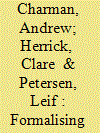| Srl | Item |
| 1 |
ID:
165855


|
|
|
|
|
| Summary/Abstract |
We advance efforts to explicate and improve inference in qualitative research that iterates between theory development, data collection, and data analysis, rather than proceeding linearly from hypothesizing to testing. We draw on the school of Bayesian “probability as extended logic,” where probabilities represent rational degrees of belief in propositions given limited information, to provide a solid foundation for iterative research that has been lacking in the qualitative methods literature. We argue that mechanisms for distinguishing exploratory from confirmatory stages of analysis that have been suggested in the context of APSA’s DA-RT transparency initiative are unnecessary for qualitative research that is guided by logical Bayesianism, because new evidence has no special status relative to old evidence for testing hypotheses within this inferential framework. Bayesian probability not only fits naturally with how we intuitively move back and forth between theory and data, but also provides a framework for rational reasoning that mitigates confirmation bias and ad-hoc hypothesizing—two common problems associated with iterative research. Moreover, logical Bayesianism facilitates scrutiny of findings by the academic community for signs of sloppy or motivated reasoning. We illustrate these points with an application to recent research on state building.
|
|
|
|
|
|
|
|
|
|
|
|
|
|
|
|
| 2 |
ID:
141070


|
|
|
|
|
| Summary/Abstract |
In early 2012, South Africa's Western Cape Province enacted new alcohol control legislation amid mounting concern with the costs of alcohol-related harms. This has focused on urban shebeen closure to control the informal, unlicensed trade and the harms it generates through crime, violence and injury. In contrast to policy discourse, this paper contends that rather than existing outside regulation, the city's shebeeners embrace multiple (self and collective) regulatory strategies to manage the inherent risks of their own informality. Drawing on novel empirical data including a ‘business census’ and interviews with the police and liquor traders across four Cape Town case study sites, the paper adds new depth to contemporary engagements with the appropriate and equitable regulation of the South African informal liquor trade.
|
|
|
|
|
|
|
|
|
|
|
|
|
|
|
|